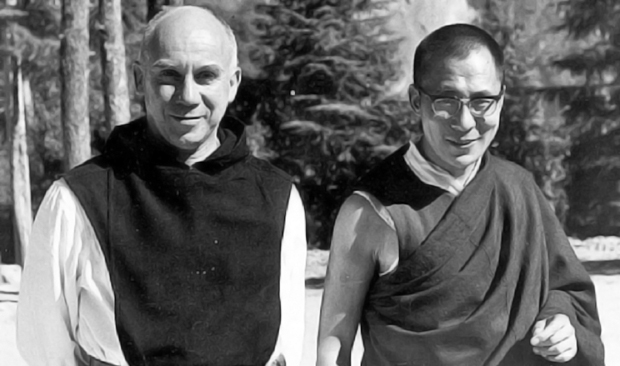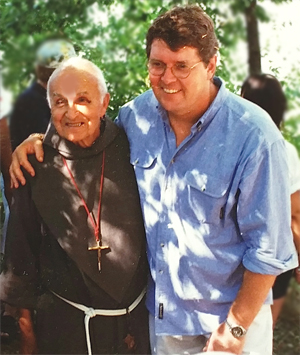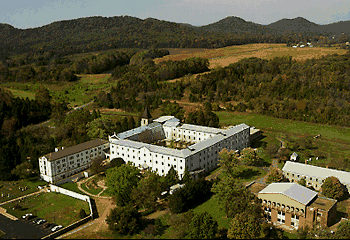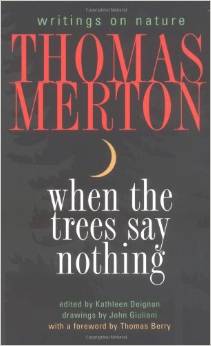
Thomas Merton and the 33 year-old Dalai Lama. From the Thomas Merton Center: “His Holiness the Dalai Lama and Thomas Merton met in November 1968 in Dharamsala, India where the Dalai Lama was living in exile. . . In his autobiography, Freedom in Exile, the Dalai Lama described Merton’s visit as one of his ‘happiest memories of this time.'” For more follow this link.
I AM A ROMAN CATHOLIC. Like many, I have struggled to marry ecological and spiritual principles. It is possible to coax instructive interpretations from the texts of the Hebrew Bible and the New Testament. But it is a largely unsatisfying effort. This leaves us with the writings of the scholars, philosophers and mystics who followed.
I turn to Thomas Merton, who would have been 100 today. He was the Cistercian Trappist monk who attained unusual fame for his bestselling 1948 autobiography, The Seven Storey Mountain, and in the 1960s for his writings on peace, civil rights, violence, nuclear disarmament, the Vietnam War and more.
Merton also blended his personal Christianity and love of nature into a seamless whole, an ecological theology that was the forerunner of the religion and environment movement that would only find fruition decades after his death.

Brother Joe Marie and I, Graymoor Monastery, ca. 2000.
I came to Merton’s teachings twenty years ago, thanks to a Franciscan friar friend at the Graymoor monastery in Garrison, NY. Knowing of my work, he gave me an audio-tape of a lecture Merton delivered in the early 1960s to novices at the Abbey of Gethsemani outside Louisville, Kentucky. He said if I listened carefully I would hear what I was seeking.
This is what Merton, the novice master, told his novices:
Some people think creation happened back in the beginning only. Creation is taking place now. At every minute. At every second. Creation never stops. It is going on all the time
And later this:
In nature, every single moment every single thing around you is doing the will of God perfectly. Everything is in perfect obedience to the will of God. This makes things very simple for you, because it leaves one little spot for you to fit into and if you fit into it you are keeping the will of God too
It is a perfect ecological theology. It advises us that we have a special place in the order of things, and if we find that place order will remain. But one need not employ the vocabulary of “God” or “Creation” to grasp its profundity. The life cycles of the planet never end. We have a choice. We can be passive beneficiaries, voyeurs, exploiters, saboteurs, or honest participants. If we choose the latter, we will perfectly carry on the work of Earth as well.

Abbey of Gethsemani. Via Trappists.org
Merton influenced a generation of Roman Catholics to look at their religion with fresh eyes, and introduced many to the ancient Christian roots of meditation and contemplative prayer. He was a committed advocate for peace, and a prolific author of books on Christian thought and discernment, deep theology, Eastern religion, the desert fathers and more. He was a published poet. Posthumously, seven volumes of personal journals were released, along with a large collection of correspondence, much of it with some of the great thinkers of the day. Merton’s influence carries on still. His books all remain in print. Countless workshops and seminars are offered each year. Centers are dedicated to his teachings. See links below.
In his later years, Merton assiduously pursued the harmonization of Western and Eastern religions. It was at a Bangkok conference on the subject that he died of accidental causes on December 10, 1968.
 In her beautiful collection, When the Trees Say Nothing, my friend Sister Kathleen Deignan of Iona College sifted through Merton’s works for his writings on nature. From her beautiful introduction:
In her beautiful collection, When the Trees Say Nothing, my friend Sister Kathleen Deignan of Iona College sifted through Merton’s works for his writings on nature. From her beautiful introduction:
What he heard in the murmurings of wilderness were “the sweet songs of living things” whose choirs he joined as a solitary monk offering a psalm of glory and thanksgiving on behalf of humankind. In time his own center became “the teeming heart of natural families” as his unique subjectivity opened to the cosmos in wonder and awe, sounding a silent interval of praise in the rapturous hymn of creation.
Turn to a random page in Merton’s voluminous personal journals and you are likely to find the day’s reflection led by the recounting of a scene from the woods around his hermitage at Gethsemane, set off by a contrasting juxtaposition, in the Eastern poetic style.
In Merton’s entry of January 31, 1968, his final year on Earth, the beauty of the rural Kentucky hills collides with the cacophony of nearby Fort Knox, a disturbing irony that regularly punctuated the journals and life of this man of peace:
Clear, thin new moon appearing and disappearing between slow slate blue clouds — and the living black skeletons of the trees against the evening sky. More artillery than usual whumping at Knox. It is my fifty-third birthday.
«« »»
Links:
International Thomas Merton Society.









